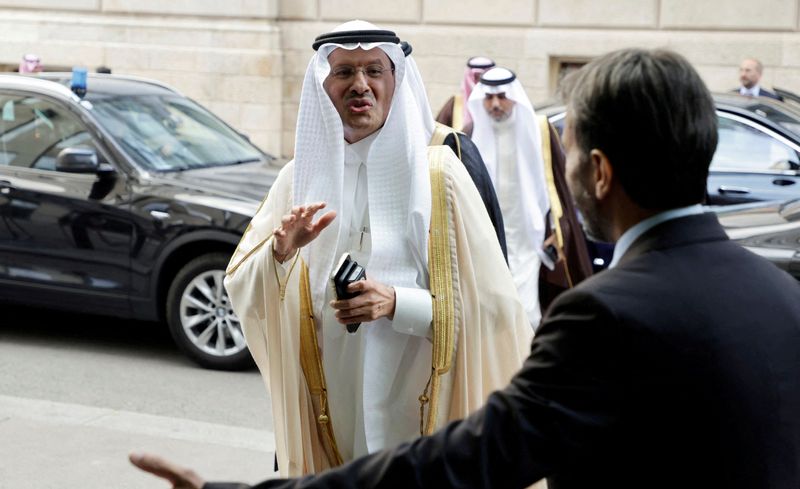By Ahmad Ghaddar, Alex Lawler and Shadia Nasralla
VIENNA (Reuters) - Russia-Saudi oil cooperation is still going strong as part of the OPEC+ alliance, which will do "whatever necessary" to support the market, Saudi Energy Minister Prince Abdulaziz bin Salman told a conference on Wednesday.
OPEC+, a group comprising the Organization of the Petroleum Exporting Countries and allies including Russia which pumps around 40% of the world's crude, has been cutting oil output since November in the face of flagging prices.
Saudi Arabia and Russia, the world's biggest oil exporters, deepened oil supply cuts on Monday in an effort to send prices higher.
Yet the move only briefly lifted the market. On Wednesday, benchmark Brent futures almost flat at $76.30 per barrel as of 1440 GMT, remaining below the $80-$100 per barrel that most OPEC nations need to balance their budgets.
OPEC says it does not have a price target and is seeking to have a balanced oil market to meet the interests of both consumers and producers.
The United States, the biggest oil producer outside OPEC+, has repeatedly called on the group to boost production to help the global economy and has criticised Saudi cooperation with Russia after Moscow's invasion of Ukraine.
But Riyadh has repeatedly rebuffed U.S. calls and Prince Abdulaziz said on Wednesday that new joint oil output cuts agreed by Russia and Saudi Arabia this week have again proven sceptics wrong.
"Part of what we have done (on Monday) with the help of our colleagues from Russia was also to mitigate the cynical side of the spectators on what is going on between Saudi and Russia on that specific matter," Prince Abdulaziz said.
"It is quite telling seeing us on Monday coming out with not only our (oil cut) extension... but also with validation from the Russian side," he told a meeting of oil industry CEOs with ministers from OPEC and allies, known as the OPEC International Seminar.
OPEC has withheld media access to reporters from Reuters, Bloomberg and the Wall Street Journal to cover the event, which was partly broadcast online.
After the end of the broadcast, Prince Abdulaziz told the seminar that OPEC+ would do "whatever necessary" to support the market, according to a source who attended the meeting.
ENOUGH FOR NOW
The International Energy Agency has said it expects the oil market to tighten in the second half of 2023, partly because of OPEC+ cuts.
Amin Nasser, boss of energy giant Saudi Aramco (TADAWUL:2222), said he was optimistic about demand growth in the mid-term as the Chinese economy and global jet fuel consumption were still recovering from their decline during the pandemic.
But analysts at Morgan Stanley (NYSE:MS) on Wednesday cut their oil price forecast, saying that while they anticipated a decrease in stocks in 2023 they forecast a surplus in the first half of 2024, with non-OPEC supply growing faster than demand.
Additional oil cuts should be enough to help balance the oil market, United Arab Emirates' energy minister Suhail Al Mazrouei told reporters on Wednesday.
"This (the latest addition output cuts) is enough to assess the market and look at the market balance," Mazrouei told reporters.
He said the UAE would not be contributing to fresh cuts as it was already producing well below its capacity.

"There’s a bigger thing… I’m seeing a lack of investments in many countries. We will have to invite maybe newcomers to come and join the group. The more countries we have... the easier the job... to ensure that the world has enough oil in the future," Mazrouei said.
"Imagine if we had 60% of the producers or 80% of the producers... We will definitely do a better job."